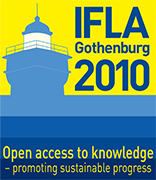Pour traductions voir le site du CFI
Call for Papers
Committee on Freedom of Access to Information and Freedom of Expression (FAIFE)
& Information Technology Section
Theme:
The New Information Environment - Who controls the information in the future?
In the rapidly evolving information environment, concepts of intellectual freedom and censorship face new kinds of challenges. Emerging technologies create new kinds of information space, in which user's rights will be redefined. The end of privacy is one of the implications where individual identity is represented across many information spaces.
The purpose of this session is to explore the future of intellectual freedom and control of information in the context of the networked environment. The main focus is on the factors which may threaten the freedom of information, but our purpose is also to examine approaches which could be used to support user's rights to information.
Lawrence Lessig identifies 4 factors influencing information architecture: technology, marketplace, regulation and users (culture). We invite papers in the following areas:
- Evaluation of new technologies and their impact for freedom of information
- Ubiquitous technologies (data integration, data sharing, user recognition and tracking, social sorting and surveillance)
- Google, globalization of data
- Accessibility of data, privileges and restrictions
- User recognition, anonymity and privacy
- Mobility
- Trends in the information marketplace
- Ownership of information
- Trends of concentration (Google, Elsevier, etc.)
- Pricing of information
- Regulative threats for free access on information
- Intellectual property and copyright
- Digital rights management and fair use
- Other type of regulations which may restrict or have chilling effects in relation to the access and use of digital information
- Possible solutions to shape a new information culture?
- Participatory economy
- Open access, open source etc.
- Privacy enhancing technologies
The programme will consist of a mixture of invited presentations and papers selected as a result of this call for proposals. The expected audience is likely to include librarians from university, public and school libraries, library associations' management, other library professionals, students and university professors.
Format of proposals
The following should be provided:- Name and institution of author(s)
- Brief biographical information on author(s)
- Title and abstract of paper ( about 300 words)
- Language in which full paper is planned to be submitted
The proposals should be in English. A full paper in any IFLA language will be accepted and will be published on the Congress web site. Possible simultaneous translation for other IFLA languages is being explored.
Send your proposals by 5 April 2010 via e-mail to:
Dr. Edmund Balnaves
E-mail: edmund@balnaves.org
Review Committee
Dr. Edmund Balnaves - IFLA IT Section Information Officer, Director Prosentient Systems
Päivikki Karhula - Chief information specialist, Library of the Finnish Parliament, IFLA/FAIFE Committee
Dr. Hermann Roesch - Executive Director of the Institute Cologne University of Applied Sciences Information Science Institute, IFLA/FAIFE Committee
Belén Llera Cermeño - Deputy Director National Library of Spain, IFLA IT Standing Committee
Andrea Marchitelli - CILEA - Sezione Servizi per le Biblioteche e l'Editoria elettronica, IFLA IT Standing Committee
The abstracts will be reviewed by the Review Committee and suitable proposals will be selected. The RC will make every effort to have representation from all continents. Successful proposals will be identified and announced by 5 May, 2010.
All accepted papers will be listed in the final Conference Programme. Therefore, a full text papers should be provided by 15 May, 2010; papers should be from 3-20 pages long.
Contributors may also be invited to submit a contribution to the IFLA Information Technology Section newsletter. The delivery of each presentation will last 20 minutes to allow a time for Q&A.
Submissions
All proposals must be in before 5 April 2010.
Please note
Authors of accepted submissions must present their papers at the conference. Registration for the day of the session is required, and it is the responsibility of presenters of accepted papers to find funding for their participation (the Congress registration fee, travel, accommodation and associated costs). IFLA and its FAIFE Core activity are not in a position to fund attendance at this Conference. No financial support can be provided by IFLA, but a special invitation can be issued to authors/presenters if that is required.
Last update: 23 March 2010
